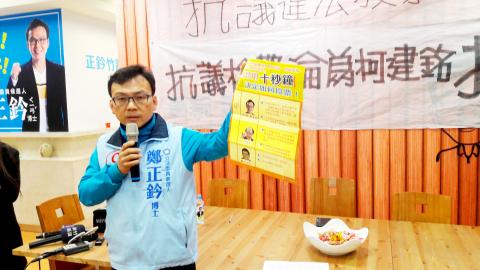Authorities said they have made persistent efforts to crack down on election-related criminal activity in recent weeks, and have handled more than 1,000 cases of suspected vote-buying, campaign violence, underground gambling on poll results and other election-related violations across the nation.
The Supreme Prosecutors’ Office yesterday said there have been reports of candidates resorting to illegal tactics by distributing smear campaign literature, along with vote-buying schemes in the run-up to Saturday’s presidential and legislative elections.
Prosecutor-General Yen Ta-ho (顏大和) said prosecutors and police are working to crack down on vote-buying and other violations, and that law enforcement agencies will promptly handle incidents of crowd violence.

Photo: Hung Mei-hsiu, Taipei Times
Supreme Prosecutors’ Office statistics indicated a total of 1,044 election violation cases, with charges against 1,797 suspects, as of Tuesday.
Among these, buying votes with cash or gifts by candidates accounted for 551 cases and 1,057 people charged, while election-related violence accounted for 69 cases and 83 suspects charged.
In their crackdown, authorities in Pingtung County raided 33 gambling operations yesterday and apprehended 27 people suspected of operating underground betting pools for wagering on election outcomes.

Photo: Liu Ching-hou, Taipei Times
Police in New Taipei City also reported a successful raid to bust the ringleaders and members of an illegal gambling operation using mobile phone apps for clients to place bets.
The New Taipei District Prosecutors’ Office said the operation had taken NT$200 million (US$5.95 million) in wagers since its launch last year, and the raid on Tuesday rounded up seven suspects, and seized NT$10 million in the bank accounts of the ringleaders.
In another development yesterday, Chinese Nationalist Party (KMT) Hsinchu City legislative candidate Cheng Cheng-chien (鄭正鈐) led supporters in a protest outside a local police station in a dispute involving smear campaign literature.
Cheng said he led the protest because of police action the previous day to confiscate bundles of campaign literature, totaling 120,000 pamphlets, which were printed and financed by supporting groups.
However, Hsinchu Prosecutor Lin Li-chia (林李嘉) said his office had received complaints, and would investigate the case, as the pamphlets were deemed to contain distortions and sensational allegations against Cheng’s rival, Democratic Progressive Party candidate Ker Chien-ming (柯建銘).
The pamphlet had a photograph of Ker, with the main headline branding him as the “Underground Emperor of Hsinchu,” along with other descriptive epithets of Ker as the “Shadow Warrior-Gangster” (黑道影武者), “Manipulator of Justice System” (司法操弄者), “Despot of Hsinchu” (新竹鴨霸者) and the “legislature’s Shady Dealmaker” (國會喬事者).

PREPAREDNESS: Given the difficulty of importing ammunition during wartime, the Ministry of National Defense said it would prioritize ‘coproduction’ partnerships A newly formed unit of the Marine Corps tasked with land-based security operations has recently replaced its aging, domestically produced rifles with more advanced, US-made M4A1 rifles, a source said yesterday. The unnamed source familiar with the matter said the First Security Battalion of the Marine Corps’ Air Defense and Base Guard Group has replaced its older T65K2 rifles, which have been in service since the late 1980s, with the newly received M4A1s. The source did not say exactly when the upgrade took place or how many M4A1s were issued to the battalion. The confirmation came after Chinese-language media reported

A Ministry of Foreign Affairs official yesterday said that a delegation that visited China for an APEC meeting did not receive any kind of treatment that downgraded Taiwan’s sovereignty. Department of International Organizations Director-General Jonathan Sun (孫儉元) said that he and a group of ministry officials visited Shenzhen, China, to attend the APEC Informal Senior Officials’ Meeting last month. The trip went “smoothly and safely” for all Taiwanese delegates, as the Chinese side arranged the trip in accordance with long-standing practices, Sun said at the ministry’s weekly briefing. The Taiwanese group did not encounter any political suppression, he said. Sun made the remarks when

The Taiwanese passport ranked 33rd in a global listing of passports by convenience this month, rising three places from last month’s ranking, but matching its position in January last year. The Henley Passport Index, an international ranking of passports by the number of designations its holder can travel to without a visa, showed that the Taiwan passport enables holders to travel to 139 countries and territories without a visa. Singapore’s passport was ranked the most powerful with visa-free access to 192 destinations out of 227, according to the index published on Tuesday by UK-based migration investment consultancy firm Henley and Partners. Japan’s and

BROAD AGREEMENT: The two are nearing a trade deal to reduce Taiwan’s tariff to 15% and a commitment for TSMC to build five more fabs, a ‘New York Times’ report said Taiwan and the US have reached a broad consensus on a trade deal, the Executive Yuan’s Office of Trade Negotiations said yesterday, after a report said that Washington is set to reduce Taiwan’s tariff rate to 15 percent. The New York Times on Monday reported that the two nations are nearing a trade deal to reduce Taiwan’s tariff rate to 15 percent and commit Taiwan Semiconductor Manufacturing Co (TSMC, 台積電) to building at least five more facilities in the US. “The agreement, which has been under negotiation for months, is being legally scrubbed and could be announced this month,” the paper said,